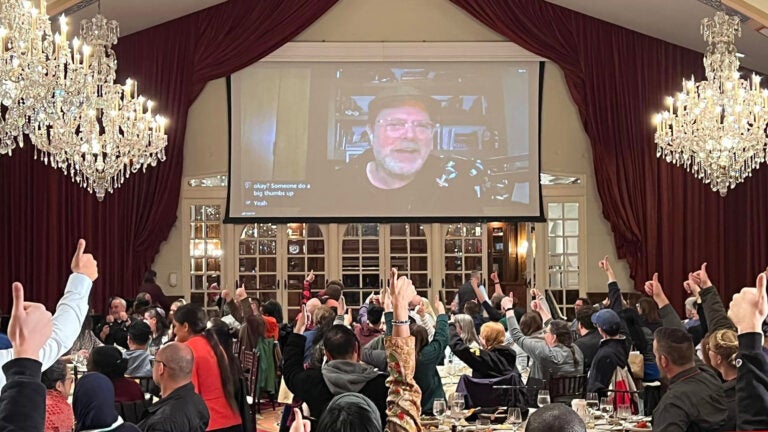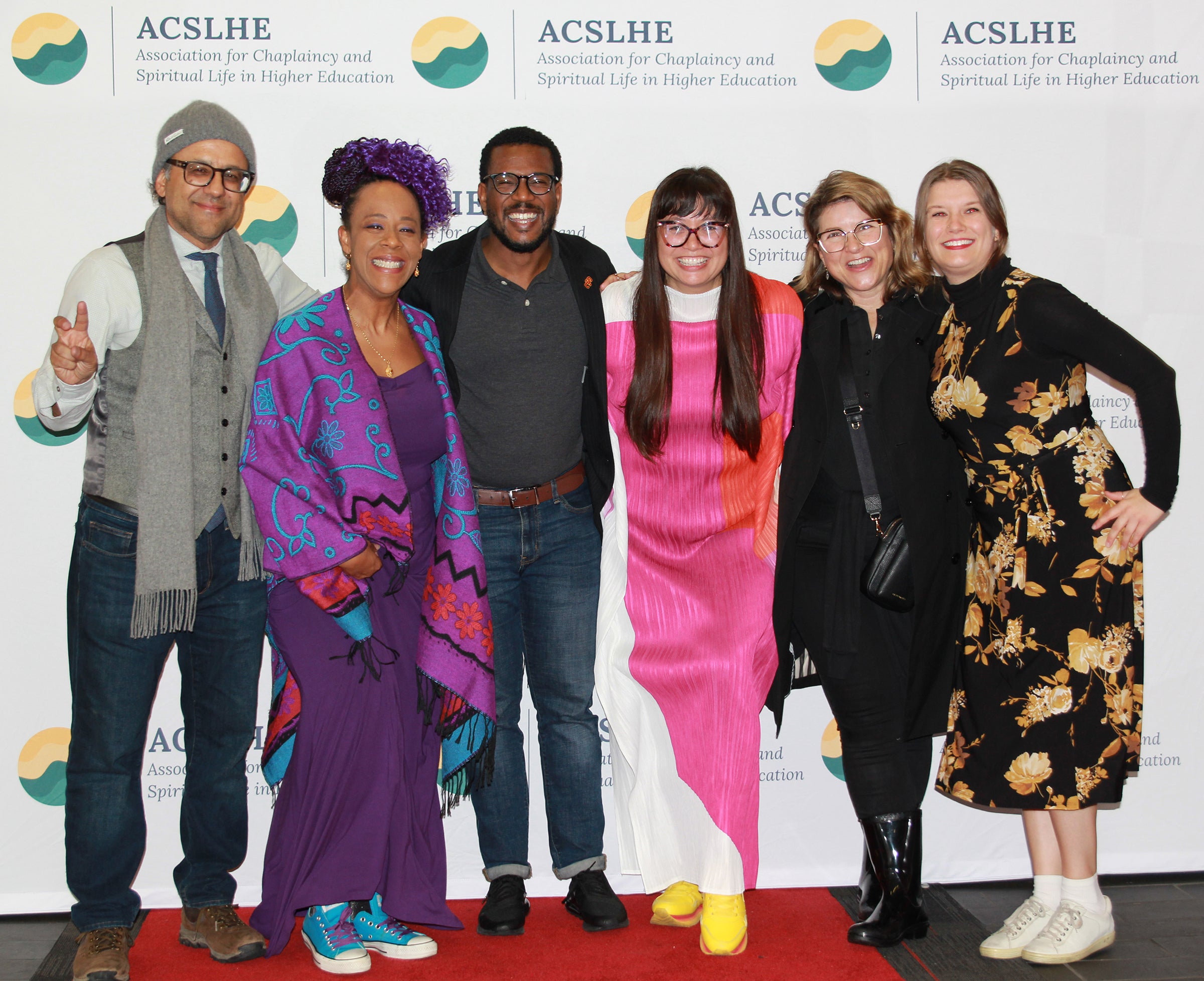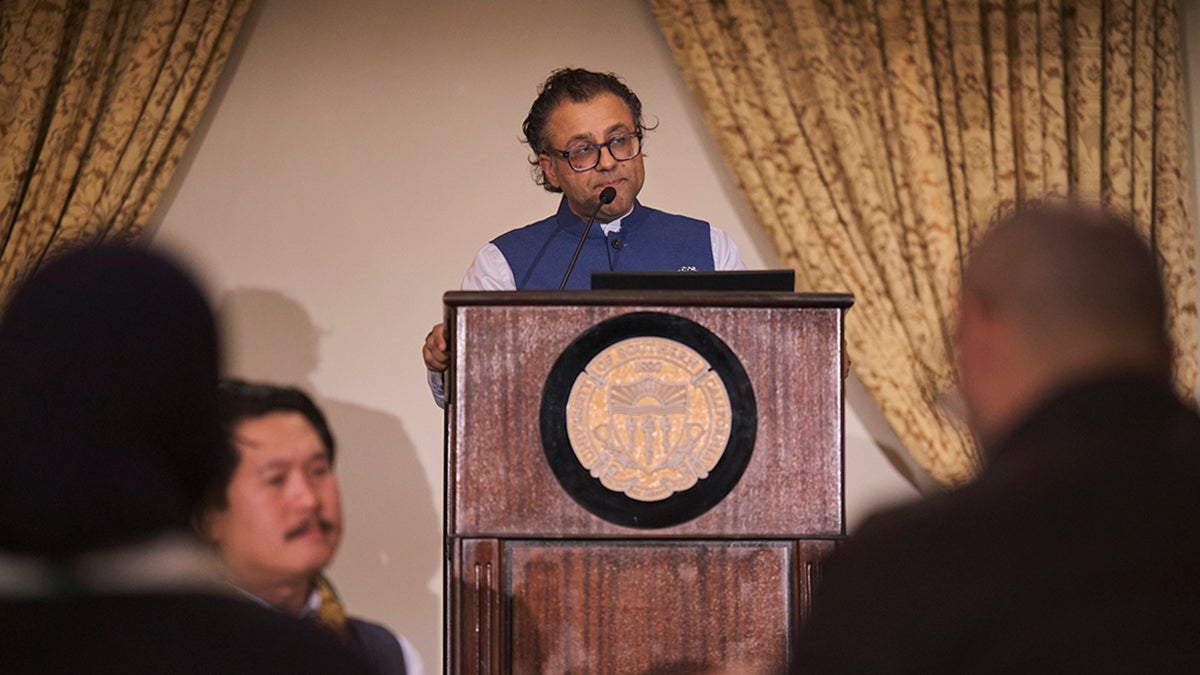
The crowd gives a big “thumbs up” to Rainn Wilson at the Association for Chaplaincy and Spiritual Life in Higher Education conference. (USC Photo/Greg Hernandez)
Gathering of university chaplains provides ‘Rebirth and Renewal’ during tough times (and record rain)
Representatives from 135 institutions take part in the Association for Chaplaincy and Spiritual Life in Higher Education conference held at USC.
USC Dean of Religious Life Varun Soni used humor to address the unavoidable fact that this week’s Association for Chaplaincy and Spiritual Life in Higher Education conference was taking place at USC’s Ronald Tutor Campus Center during what he described as “an atmospheric river of biblical proportions.”
“When I got to USC, they told me God was a Trojan, so I thought I’d have more control over the weather than I actually do,” Soni said Sunday as he greeted approximately 250 university chaplains and spiritual life professionals. “With the rain, there’s nowhere else to go. So, let’s make the most of it because we really need to be with each other right now.”

Representatives of private and public schools from every corner of the United States converged on the University Park Campus for the conference, including Emory University, Harvard University, Howard University, the University of Chicago and others. Local attendees came from California Lutheran University, Chapman University, the Claremont Colleges, Loyola Marymount University and Pepperdine University.
The theme for this year’s annual gathering, which concluded on Tuesday, was “Rebirth and Renewal.” The conference held special significance as it was the first opportunity for association members to physically gather since the start of the Israel-Hamas war and the horrors that have followed in Gaza and elsewhere in Israel and Palestine.
“I am so grateful for this gift of togetherness right now,” Soni said. “Over the last several months, we’ve all been carrying so much pain — the pain of the world, the pain of our campus, the pain of our students, our own pain. We support so many, and we could really use some support for ourselves right about now.”
Looking beyond politics
USC is home to more than 80 religious and spiritual groups and more than 50 religious affiliates. In his remarks, Soni offered some personal insight into the heightened intensity of his work with students during the past four months.
“I’ve tried to honor their experiences — to look beyond the politics and toward the pain,” he said. “While the politics are divisive, the pain is shared and many people on my campus have been wrestling with the same five overwhelming emotions: grief, anger, abandonment, fear and exhaustion. I’ve tried my best to walk alongside my fellow Trojans and their pain.”
USC President Carol Folt addressed attendees via video on Monday and started her remarks by acknowledging that it has been “an unbelievably difficult year” for religious and spiritual leaders on campuses across the country since the Oct. 7 attack by Hamas. Folt acknowledged that “we’re all trying to combat antisemitism and Islamophobia. We’re facing hatred in all of its forms.”
“I know that I probably speak for virtually every president in America to say how grateful we are that we have you as our colleagues,” she said to attendees, who came from 135 different institutions. “I know that you’ve been on the front lines, and you’ve been caregiving.”
Keeping hope alive for students
Soni took to the podium at USC’s Town and Gown before dinner was served on Sunday night and got a nice laugh amid some groans of disappointment when he announced: “Rain has kept Rainn away.” While the storm prevented keynote speaker Rainn Wilson — best known for his role as Dwight Schrute on the sitcom The Office — from being able to safely travel to campus, the actor appeared live via Zoom for a conversation with Soni and took questions from the audience.

Wilson, author of the book Soul Boom: Why We Need a Spiritual Revolution, shared how his spiritual path saved his life when he struggled with depression, crippling anxiety attacks and addiction issues. The feeling of “never-enoughness” continued to haunt him even as he earned three Emmy Award nominations, hosted Saturday Night Live and reached other career heights.
The actor has been open about his struggle and said it is often something Generation Z audiences can relate to since they are feeling anxiety over climate change, racism and the overall state of the world.
Wilson argued that young people have to believe that problems can still be solved, and that many are no longer looking to organized religion for guidance. “So many young people that I speak to these days don’t see a way out,” Wilson said. “When I was young, we talked about world peace a lot. Politicians talked about world peace. Diplomats talked about world peace. Artists talked about world peace. Even beauty contestants talked about world peace. Now if you talk about world peace, you’re laughed at, dismissed with eye rolls, and people scoff.”
In his conversation with Wilson, Soni said more than half of USC’s first-year students are not affiliated with religion, so he speaks to them about “calibrating an internal compass to point to their true north.”
“I think our job as spiritual people walking the spiritual path alongside young folk is to keep that hope alive,” Wilson said. “Maybe it’s through harnessing the power that is there from all of our faith traditions to heal, unite and bring people together.”



